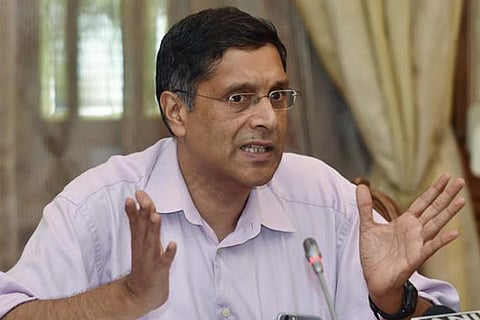

Conceding that bailing out big borrowers will lead to the allegations of corruption and crony capitalism, he underlined that at times there is no other way to solve the problem but to write off the mountain of debt.
The Non Performing Assets (NPAs) or bad loans in the banking system, particularly state-owned lenders, more than doubled to Rs 6.95 trillion (Rs 6.95 lakh crore) or over 9.3 per cent in 2015-16 from close to Rs 2.97 trillion 2012-13.
As of December 2016, the total stressed assets, including restructured accounts, amounted to more than 15 per cent of the total advances.
In order to tackle the mounting NPAs, there have been suggestions from various quarters to set up a ‘bad bank’, which Subramanian said could be a state-owned entity to collect banks’ sour assets and try to resolve the stress, which may include writing off the bad loans where there is no scope of revival.
“It is a very difficult problem and not unique to India. No political system finds it easy to forgive debt to the private sector, especially to big companies,” he said, while delivering the Hormis Memorial Lecture organised by Federal Bank here last evening.
“You need to be able to forgive those debts because this is how capitalism works. People make mistakes, those have to be forgiven to some extent,” he said.
“Political system has to be able to do that and bad bank is one way of trying to do that,” he said.
Subramanian also said that the bad bank will adopt all other options of resolution, including changing the promoters and management as well.
There is a twin balance sheet problem, of stress in the corporate sector as well as the banks due to bad assets, which needs to be resolved so as to facilitate credit supply to the economy.
During a meeting of the Finance Ministry with the Reserve Bank brass last week to resolve stress in the system, the idea of a national bad bank reportedly took the back seat with the key players - the government, RBI and even large state-run banks - not favouring the idea.
Setting up of a bad bank to hold such loans did not seem to be a top alternative for policy makers.
“We will have to weigh the pros and cons well before using tax payers’ money to set up a bad bank,” a source had said after the meeting.
Chief Economic Advisor Arvind Subramanian has said demonetisation can be called successful only if the amount of currency in circulation comes down over time and there is an increase in tax compliance.
“Before demonetisation, the cash to GDP ratio was something like 12 per cent. Going forward, that should come down if demonetisation is to be deemed successful,” he said while addressing a gathering here last night.
Underlining that there are cost and benefits of the note ban move, the CEA said the cash circulation in the economy is easily measurable. He also said the number of taxpayers needs to go up for the cash ban move to be called a success.
Though the Reserve Bank has remonetised only under 70 per cent of the cancelled money, it has lifted all the curbs on withdrawals from yesterday.
The move seeks to signal a “regime shift”, Subramanian said, adding that tax compliance should also increase as a result of it. “The general culture of non-compliance and illicit money creation should also improve through demonetisation, which was trying to signal a regime shift that in future this behaviour will be less tolerated,” he warned.
Subramanian said that while the progress of digitization can and will be monitored to show the success of the move, sufficient attention should also be given to see how the 35 million people who neither own a smartphone nor a feature phone are taking to the digital process.
But he was quick to add that the country is a cash-based economy and digitisation should not be imposed on such people.
“We’ve to be careful that we do not force digitalisation on those who do not have access in a way that makes them handicapped because we are in a cash economy and we need to be cognisant of that fact,” he said.
Visit news.dtnext.in to explore our interactive epaper!
Download the DT Next app for more exciting features!
Click here for iOS
Click here for Android